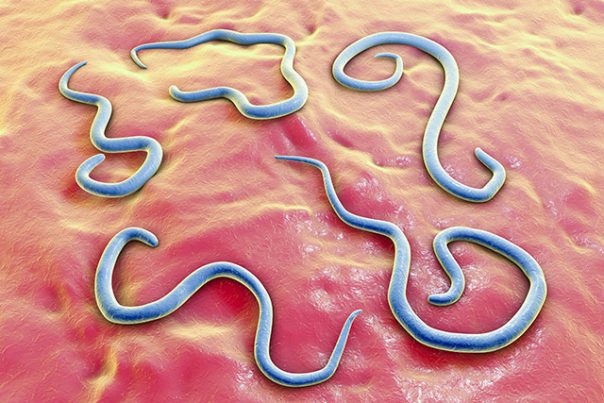
Visceral larva migrans – causes, side effects and treatments at NaturalPedia.com
Friday, July 20, 2018 by Janine Acero
http://www.naturalpedia.com/visceral-larva-migrans-causes-side-effects-and-treatments-at-naturalpedia-com.html

Visceral larva migrans (VLM), also known as systemic toxocariasis, is an infection in humans caused by parasitic roundworms — Toxocara canis and T. cati — that are usually found in the intestines of dogs and cats.
Eggs from the worms pass into the feces of dogs and cats and can contaminate areas around the home where kids play. The eggs can be accidentally ingested, especially by children who put things in their mouths and don’t often wash their hands.
Adults can become infected if they work with dirt and accidentally ingest dirt containing Toxocara eggs.
Infection can also occur from ingestion of undercooked or raw meat/poultry, albeit rare.
Known symptoms and risk factors for visceral larva migrans
The symptoms of VLM may depend on the number and specific location of roundworm larvae present in a person’s body system.
Mild infections may not cause symptoms, while serious infections may cause these signs:
- Abdominal pain
- Cough
- Fever
- Irritability
- Itchy skin (hives)
- Shortness of breath
- Wheezing
VLM may also affect the eyes, causing impaired vision, swelling around the eyes, or a cross-eyed appearance. Untreated VLM can damage the retina.
Body systems harmed by visceral larva migrans
If left untreated, or with delayed treatment, VLM can lead to some complications, such as:
- Blindness
- Cardiac arrest
- Difficulty breathing
- Encephalitis (brain infection)
- Epilepsy
- Heart rhythm problems
Food items or nutrients that may prevent visceral larva migrans
The following foods and nutrients contain compounds that effectively get rid of parasites and help treat infections:
- Garlic is a natural anti-parasitic and antibiotic food, and is known to help bowel movements and bowel detoxification.
- Fermented foods are full of probiotics, which are great at getting rid of bad stuff in the gut and restoring more good bacteria. These include raw, grass-fed dairy products such as yogurt; kimchi; sauerkraut; and fermented vegetables, which also have fiber that helps move parasites along the digestive tract.
- Papaya seeds have antihelminthic and anti-amoebic activities, which effectively treat parasitic infections. They are more effective when consumed with honey.
- Pineapple contains bromelain, which can kill parasitic infections and restore digestive health.
- Turmeric extract and essential oil have been shown to inhibit the growth of parasites.
- Wormwood is an herb that helps kill adult parasites. You can find it in tea, capsules and in concentrated liquid form.
Treatments, management options for visceral larva migrans
In most people with VLM, the infection resolves on its own, and treatment is unnecessary. In severe cases, treatment mainly involves the use of anthelmintic drugs such as albendazole or mebendazole plus corticosteroids, but surgery may be required to physically remove larvae from the affected organs or tissues.
VLM may be prevented by de-worming dogs and cats and training them to defecate in designated areas, instead of public places where most people and children are exposed. Covering sandboxes when not in use prevents animals from defecating in them.
It’s best to discourage children from eating non-foods, such as soil and clay, and other things that have been exposed to dirt that may be contaminated with parasites.
It’s also important to wash your hands thoroughly, and teach children to do the same, after touching soil or after touching cats or dogs.
DO NOT eat raw liver from a chicken, lamb, or cow.
Occasionally, laser photocoagulation (application of an intense beam of light) is used to kill larvae in the eyes.
Where to learn more
Summary
Visceral larva migrans (VLM), also known as systemic toxocariasis, is an infection transmitted from animals to humans. It is caused by parasitic roundworms found in the intestines of dogs and cats.
The parasites pass into the feces of dogs and cats and contaminate areas where the animals defecate, mostly around places where children play. The eggs can be accidentally ingested, especially by children who touched dirt and put things into their mouths without washing their hands.
Although rare, infections can also occur from ingestion of undercooked or raw meat/poultry.
Sources include:
Tagged Under: Tags: Visceral larva migrans





